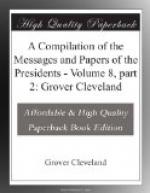be useless, and perhaps invidious, to enumerate the
evils of which, in the opinion of many of our fellow-citizens,
this error of the sages who framed the Constitution
may have been the source and the bitter fruits which
we are still to gather from it if it continues to
disfigure our system. It may be observed, however,
as a general remark, that republics can commit no
greater error than to adopt or continue any feature
in their systems of government which may be calculated
to create or increase the love of power in the bosoms
of those to whom necessity obliges them to commit
the management of their affairs; and surely nothing
is more likely to produce such a state of mind than
the long continuance of an office of high trust.
Nothing can be more corrupting, nothing more destructive
of all those noble feelings which belong to the character
of a devoted republican patriot. When this corrupting
passion once takes possession of the human mind, like
the love of gold it becomes insatiable. It is
the never-dying worm in his bosom, grows with his growth
and strengthens with the declining years of its victim.
If this is true, it is the part of wisdom for a republic
to limit the service of that officer at least to whom
she has intrusted the management of her foreign relations,
the execution of her laws, and the command of her
armies and navies to a period so short as to prevent
his forgetting that he is the accountable agent, not
the principal; the servant, not the master. Until
an amendment of the Constitution can be effected public
opinion may secure the desired object. I give
my aid to it by renewing the pledge heretofore given
that under no circumstances will I consent to serve
a second term.
But if there is danger to public liberty from the
acknowledged defects of the Constitution in the want
of limit to the continuance of the Executive power
in the same hands, there is, I apprehend, not much
less from a misconstruction of that instrument as
it regards the powers actually given. I can not
conceive that by a fair construction any or either
of its provisions would be found to constitute the
President a part of the legislative power. It
can not be claimed from the power to recommend, since,
although enjoined as a duty upon him, it is a privilege
which he holds in common with every other citizen;
and although there may be something more of confidence
in the propriety of the measures recommended in the
one case than in the other, in the obligations of
ultimate decision there can be no difference.
In the language of the Constitution, “all the
legislative powers” which it grants “are
vested in the Congress of the United States.”
It would be a solecism in language to say that any
portion of these is not included in the whole.




